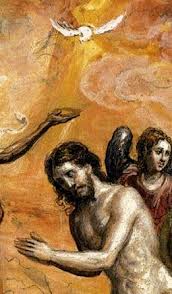by Fr. Patrick Henry Reardon
 Jesus, when he spoke of his coming death and Resurrection, referred to the Father’s “command”:
Jesus, when he spoke of his coming death and Resurrection, referred to the Father’s “command”:
“Therefore my Father loves me, because I lay down my life that I may take it again. No one takes it from me, but I lay it down of myself. I have power to lay it down, and I have power to take it again. This command (entole) I have received from my Father” (John 10:17-18).
Jesus spoke of this paternal “command” again on the night of his betrayal:
“But that the world may know that I love the Father, and as the Father commanded me (eneteilato moi), so I do” (14:31).
This was the Father of whom he declared,
“I do always those things that are pleasing (aresta) to Him” (8:29).
Jesus, then, within the setting of his intimate relationship to his Father, learned what the Father wanted of him. This was the fruit of his prayer.
How did the Father speak to His Son during those numerous hours, especially at night (cf. Mark 1:35; 6:46; Luke 5:16; 6:12, etc.), when Jesus communed with Him in prayer?
At first this question may seem impossible to address, much less to answer, but the Evangelist Luke appears—ever so gently—to raise a veil from the mystery of Jesus’ prayer when he describes his baptism:
“Now it happened, when all the people were baptized, and Jesus—having been baptized—was praying, that heaven was opened, and the Holy Spirit, in bodily form like a dove, came down upon him, and there was a voice from heaven: ‘You are My beloved Son; in you I am well pleased'”(Luke 3:21-22).
These words give us, I suggest, both the sum and the setting of everything the Father had to say to His Son in their communion. The Father’s “command,” His entole, was embraced in the words,
“You are My beloved Son; in you I am well pleased.”
These words expressed both the identity of Jesus and the salvific will of the Father.
When the Father addressed him as “beloved Son” and declared Himself “well pleased,” Jesus was not hearing something new, a thing hitherto unsuspected. On the contrary, these expressions resonated in his mind and sense of destiny, taking shape through certain biblical references with which he was familiar from his years of youthful study in the synagogue.
Two references, in particular, seem obvious: The first is the divine command Abraham received with respect to Isaac:
“Take now your son, your only one, Isaac, whom you love, and go to the land of Moriah, and offer him there as a burnt offering on one of the mountains of which I shall tell you” (Genesis 22:2).
That biblical story, the memory of which was evoked by the “voice from heaven,” summoned Jesus to take on Isaac’s sacrificial burden. Even before beginning the other components of his ministry, Jesus was aware of the coming tragic events that would put an end to it.
The reference to Isaac and Abraham, in the baptismal scene, is even more apparent in the Greek (Septuagint) version of Genesis 22:2, where the Hebrew word for “only” (yahid) is changed to “beloved” (agapetos):
“Take your beloved son, whom you love . . .”
The second biblical reference evoked by the voice from heaven came from the Book of Isaiah and introduced God’s mysterious Suffering Servant:
“Behold! My Servant whom I uphold; / My soul delights in My chosen one. / I have put My Spirit upon him” (42:1).
We observe that the beloved Servant’s vocation is indicated by the descent of the Spirit.
Although I have quoted this prophecy as it appears in the transmitted Hebrew (Massoretic) text, the early Christians were familiar with another version of it, a Greek translation closer to the Aramaic words Jesus heard at his baptism. Matthew quotes the passage thus:
“Behold! My Servant whom I have chosen, / My beloved [agapetos] in whom My soul is well pleased! / I will put My Spirit upon him” (Matthew 12:18).
Thus, in the Holy Spirit’s descent on Jesus and the Father’s voice addressing him as “Son,” the scene recalls both Isaac and the beloved Suffering Servant; these images came to determine Jesus’ understanding of the Father’s will for him.
In its evocation of these two prophetic texts—conveyed in the Father’s communication to Jesus while he prayed—the beloved Son and the true Isaac were identified as one and the same with the Suffering Servant.
The Savior learned this in his communion with the Father in prayer.
